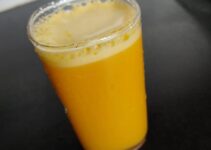Introduction
It is mentioned in our scriptures the earth, in order of creation, occupies the fifth position. In order of preference, we need space, air, heat, water and food first. But, it is as important as other elements due to its significant role in acquiring, sustaining, maintaining, and restoring health. Blood lymph hormones, the vital fluids for the body, cells, tissues, muscle organs, skin, bones, etc., are the product of the food we eat. The natural food taken moderately by the laws of eating for health serves for the growth & replacement of cells, supplies nutrients, known & unknown trace elements, and enzymes of the body for the repair, maintenance and sustenance of their health, to maintain, regenerate the vital forces or life force.

30 Medicinal valued foods for wellness
Foods consumed according to the needs of the individual in this context to his health or diseases and the value of composition of the foods, etc., contribute to the medicinal value of food. For example, bitter gourd is used to control hyperglycemia & its effect on the digestive system is laxative or even purgative sometimes. A person with diabetes, due to various reasons, is suffering from diarrhoea, though bitter gourd is good for diabetic; in that acute condition, he is not advised bitter gourd. This understanding in every moment of activity is essential. Another example is that I have no hunger today; I eat routine food like rice, dhal, vegetables, vegetable soup, or jeera water according to the cause. The body and mind get rest & healing from the suffering & then we can regain a regular diet.
- Aloe Vera: Aloe Vera helps in acidity, digestion, absorption, and assimilation of nutrients, enhances the immune system, detoxifies toxins, is beneficial in ulcers, potent-anti inflammatory, has an antibacterial, anti-viral, anti-fungal, anti-parasitic effect on the body
- Amla (gooseberries): Amla is rich in vitamin ‘C’, 15 times more than lemon. It is an antioxidant. It has a cooling effect; it brings an emotional healing effect to the body. Suitable for colds, coughs, bronchitis, and bronchial asthma.
- Ash Gourd: It helps reduce weight and acidity and neutralises blood acidity. Ulcers, stomatitis, skin allergies, and burning micturition can be treated effectively with this Juice.
- Apple: Good for anaemia, gout, pyorrhea, ulcers, diabetes, cough, cold, colitis, asthma, and urine inconsistency. However, it is always advised to be seasonal and fresh because storage reduces nutrients. It also has soluble fibre, which reduces blood cholesterol.
- Aniseed (Saunf): It is an ancient practice to give Saunf after meals. It helps in easy digestion, reduces flatulence, and helps to eliminate the wind from the stomach and intestine. It has a smoothening effect on the stomach. It is used as a flavouring agent in many of the sweet dishes. It improves the lactation of nursing mothers.
- Asafoetida (Hing): It is commonly used as a flavouring agent and for its digestive properties in Indian cuisine. It relieves spasms and indigestion. It has expectorant and analgesic properties. It brings mental alertness and sharpens memory.
- Beetroot: It is rich in potassium, sodium, magnesium, and iron. The juice or the syrup prepared by adding organic jaggery helps to treat anaemic conditions.
- Banana Pit: The soft white fibrous portion of the banana tree is used in southern India as a vegetable. It has a diuretic effect, which helps remove renal stones. Due to its fibrous content, the vegetable is filling and low calorie.
- Bitter Gourd: It helps neutralise high blood sugar levels. It acts as a laxative with other vegetables and a purgative if the juice is taken on an empty stomach.
- Bishops weeds (Ajwain): It helps in all spasmodic disorders. The decoction of Ajwain, saunf, and dhania seeds, about 1/2 tsp. in one litre of water boiled for 10-15 minutes, gives a good decoction & can be given two to three times a day to relieve gastritis, constipation, and indigestion, worm infestations. It also helps with bronchitis, asthma, viral fevers, migraines, skin irritation, etc. It is also an antioxidant.
- Carrot: It is rich in vitamin A, folic acid, sodium, potassium and C. It is effective in anaemia, acidity, underweight, growth, etc. Mixed celery, carrot, beet, and tomato juice is good for treating most diseases. It can be taken as a morning drink.
- Coriander: It is rich in vitamins A, B1, B2, Niacin & C. Its diluted juice – 100 ml & one tablespoon honey / organic jaggery powder helps in frail condition.
- Cumin seeds (jeera): highly beneficial in treating digestive disorders, morning sickness and indigestion. 1 tsp. Of powder mixed with 1 tsp. Honey can be given to children for better digestion. The decoction of jeera acts as a diuretic and anthelmintic (against worm infestation), causing jaundice, vomiting and nausea. 1/4 tsp of powder taken in diluted buttermilk helps to control dysentery, diarrhoea, colitis, and insomnia and relieves colicky pain. It is suitable for lactating mothers. It is used in seasoning as a flavouring agent but loses its medicinal value.
- Curry leaves: juice of 50-100ml with two tablespoons honey or organic jaggery powder is helpful in anaemic conditions, deworming, etc., 2-3 tsp juice in 100 ml diluted buttermilk 1/4 tsp. of cumin powder & a pinch of salt is a good appetiser & soothing to the stomach. People complaining of a bloated feeling immediately after food should take this half an hour before meals.
- Drumstick leaves: Raw juice mixed with cold milk can relieve chronic constipation. It has to be taken at night with 100 diluted juice with 100 ml of boiled & cooled milk without having dinner. It is suitable for anaemic conditions, worms and diabetes. Soup of the leaves or vegetables is also highly beneficial.
- Fenugreek (Methi): The seeds are rich in amino acids, choline, essential oil, saponin, and volatile oil. It also contains calcium, phosphorus, iron, caroline, thiamine, niacin, riboflavin etc. It is a good blood and body cleanser, antibiotic, anti-ulcer, anti-cancer, and antidiarrhoel. It helps with menstrual and menopausal problems & it helps the nursing mother with better lactation. Research also shows it is very effective in diabetes to control sugar levels.
- Gauva: It is rich in Iron & vitamin C; it is beneficial in constipation. Good for growth. Chutneys and jams are suitable for children but prepared with molasses, honey, or organic jaggery, not sugar.
- Grapes: juice or fruit is rich in vitamins A & B, minerals – potassium, iron, calcium, manganese, chlorine, fluorine, sulphur & phosphorus. It contains proteins and carbohydrates. It is suitable for the liver & kidneys and helps detoxify and purify the blood. Though sour, it is highly alkaline due to alkaline salts.
- Ginger It is used only as a flavouring agent, without realising its immense medicinal value. It is a blood purifier and blood thinner (anticoagulant). It reduces gastric secretion in the stomach. It helps with jaundice, cough, cold, colicky, nausea, travel sickness etc. It can also be an antibiotic, anti-inflammatory, decongestant, expectorant and antispasmodic. Hence, it benefits asthma, cold & cough, fevers, diabetes, and hypertension worm infestations. TB, typhoid etc
- Lemon: Rich in vitamin C, it cures Scurvy; it is the best cleanser, a good disinfectant, antibacterial, and antidote for many of the toxic substances in the body. It suits asthma, cold, cough, sinusitis, pyorrhoea, and stomatitis. It also helps to reduce fat in the body & blood.
- Liquorice (Jasthimadh) is a famous multipurpose flavouring agent. The root of the plant is used for laxative and expectorant purposes. It is suitable for skin, antibacterial, anticancerous, diuretic & antipyretic effects. It helps to relieve muscular pains.
- Mint (Pudina): Tasty aroma herb used commonly in Indian cuisine in chutneys, sauces & vegetables, etc. It is suitable for gastritis, liver, Kidneys, and bladder; it is a good appetiser and kills harmful bacteria and gems.
- Onion: It has a lot of medicinal value, but the way it is used in Indian cuisine is anti-medicinal. It has to be consumed raw in salads, chutneys, etc., but not fried. It reduces cholesterol, diuretic, antiseptic, and anti-inflammatory.
- Papaya: It is alkaline; it has vitamins A, B, C, and D, calcium, phosphorus & iron. It is perfect for all digestive disorders – acidity, indigestion, and constipation. It is beneficial for kidney stones.
- Pineapple: Good Vit A, C, and B source. Its enzyme bromelain is good for digesting proteins. It is a good anti-inflammatory for pneumonia and bronchitis. It is a good liver rejuvenator.
- Pepper: It is suitable for colds, coughs, fever, muscular pain, amnesia and bronchitis. It has a stimulating action on digestive activities. It acts like an antibiotic effect.
- Poppy seeds (khus Khus) contain oxalic acid & opium with 25 alkaloids. It is high in protein. It is suitable for fever, inflammation, insomnia, and body aches.
- Spinach (palak): It is a very nutritious leafy vegetable rich in vitamins A & C. It is a good source of protein, fibre, calcium, phosphorus etc. It is beneficial in constipation, anaemia, and gastritis.
- Tulasi (Basil): Every Indian household prays offerings by planting this herb in front of every house. It is also believed to be an air purifier. It has an antiseptic, antibacterial, and anti-fungal effect. Good in skin diseases, colds, coughs, and even malaria, it is practical, effective, and beneficial in the circulatory, excretory & urinary systems. It is a multipurpose herb; name any disease, and Tulasi is the remedy.
- Turmeric: It is a widespread colouring and flavouring agent in Indian cuisine & not only that, it is used for Pooja (prayer offerings and rituals). The practices interwoven in the lifestyle give them antiseptic, antifungal, antibacterial, blood purifier, expectorant, antipyretic & analgesic effects. It is suitable for all intestinal disorders, boils, skin disorders, anaemia, colds, coughs, etc. Can any drug or pill imitate nature’s product to such an extent?






